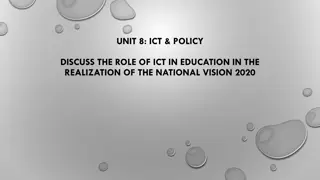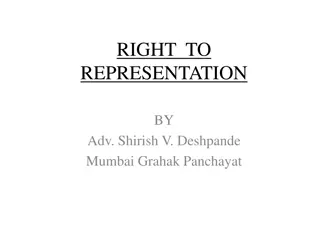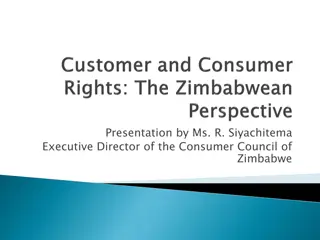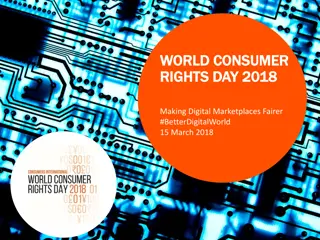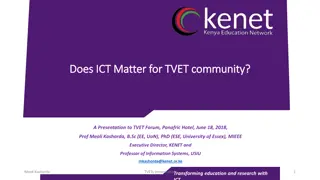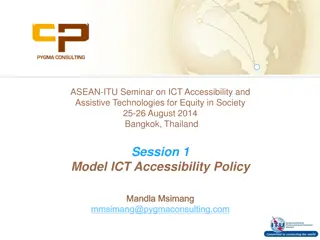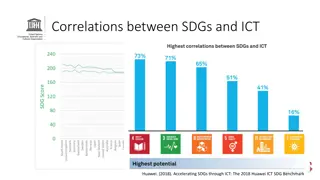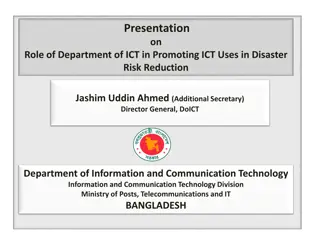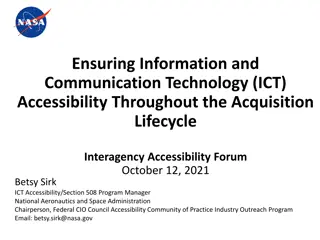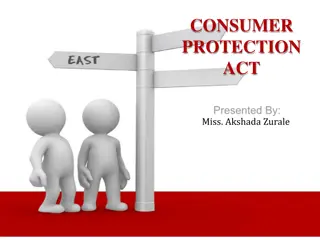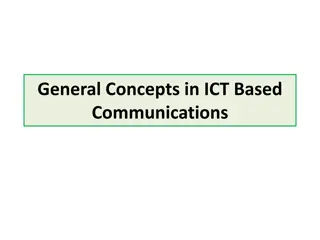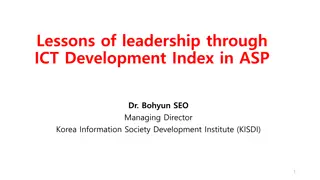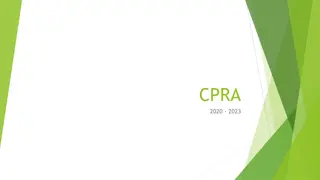Consumer Rights and ICT: Empowering Consumers Through Information and Communication Technology
Ensuring consumer rights, such as access to basic needs, safety, information, choice, and education, is crucial in today's society. Information and Communication Technology (ICT) plays a significant role in empowering consumers by providing access to information, promoting safety, facilitating informed choices, and enhancing consumer education. ICT enhances efficiency and transforms economic and social lives, ultimately contributing to the improvement of quality of life indicators like education, health, income, governance, and technology, as proposed by the United Nations Commission on Science and Technology Development.
Download Presentation

Please find below an Image/Link to download the presentation.
The content on the website is provided AS IS for your information and personal use only. It may not be sold, licensed, or shared on other websites without obtaining consent from the author. Download presentation by click this link. If you encounter any issues during the download, it is possible that the publisher has removed the file from their server.
E N D
Presentation Transcript
CONSUMER RIGHTS AND ICT CONSUMER RIGHTS 1. The right to basic needs This refers to the right to basic goods and services such as adequate food, health care, sanitation, clothing and health. The right to basic food is synonymous to the right to survive. Consumers of all age groups from infants to the aged should be guaranteed of these basic necessities.
2. and 3. The right to Safety and Healthy environment The right to safety calls for protection against marketing of products, production processes and services which are hazardous to health or life. Consumers also have the right to live in an environment which is neither threatening nor dangerous and which permits a life of dignity and well being. 4. and 5. The right to information and the right to choose. The right to be protected against dishonest and misleading advertisements or labelling. The right to be given the facts and information needed to make informative choices. The right to choose products and services at competitive prices with an assurance of satisfaction in quality.
8. The right to consumer education The right to consumer education entails the right to acquire knowledge and so as to be an informed consumer in life.
DEFINING ICT Information technology and communication is the use of man made tools for the collection, generation, communication, recording, re-management and exploitation of information. It includes those applications and commodities by which information is transferred, recorded, edited, stored, manipulated or disseminated
ICT covers any product that will store, retrieve, manipulate, transmit or receive information electronically in a digital form. For example, personal computers, digital television, email, robots. ICT acts as a voice for consumers and a platform for airing and communicating views and comments. ICT increases efficiency, a revolution which has penetrated all fields of human activity thus transforming economic and social lives of consumers.
In June 1996 the United Nations Commission on Science and Technology Development proposed five development indicators that focused on the improvement in of the quality of life these are : Education Health Income Governance Technology
If we consider these key terms indicators of development for Zimbabwe, ICTs can be socially beneficial only if they contribute to poverty eradication (higher income) , improved health and education, better use and more equitable sharing of resources and raising participation and access to information is quite crucial
ICTs have been important since they have led to improvement on the processing of information, communication and information sharing to one another irrespective of distance and on real time basis.
Due to the critical role ICT is playing in the socio-economic advancement of Zimbabwe, its stability is attracting greater focus. The more access a nation has to affordable and reliable telecommunications solutions, the higher its growth prospects become.
The ultimate question is whether Zimbabwe s consumers are getting value for money or not? The economy has made very encouraging progress since dollarization however costs of living and doing business have continued to hover above the rest of Southern Africa
A converged effort on the part of consumers and the Consumer Council of Zimbabwe is required to blow away the smoke screens of deception consumers have had to deal with. A balance must be struck in which all stakeholders of the ICT sector find common ground and transparently lay their facts out. However there is still a challenge to devise initiatives to address a host of issues such as reliable infrastructure, skilled human resource, open government, and other essential issues of capacity building and laws and regulations which fully protect consumers.
UNIFYING ICT AND CONSUMER RIGHTS The right to basic needs Among the 8 rights stated above, the right to basic needs comes top; ICT is very crucial in providing information and communicating to consumers about fundamental needs. In making sure that consumers are aware of this right, Consumer Protection Agencies can communicate and tell consumers through internet and various forms of the media. The right to Safety and Healthy environment When ever there is a danger of harmful products in a market, or unethical marketing or misleading information about a certain product the use of ICT through the media acts as a tool in enlightening consumers about such unscrupulous products.
The right to information and the right to choose I C T also plays a role in providing information of any products or services to consumers either through the web or adverts in print or television and radio. Hence consumers can choose where to buy from. The right to be heard and to redress I C T acts as a voice for consumers, where consumers can air their views through the media and make full and sympathetic consideration in the formulation and execution of social and economic polices.
The right to consumer education Consumers can various knowledge and information through various ICT devices (radio, television and internet) so as to be informed consumers in life.
IMPORTANCE OF ICTS ICTs are crucially important for sustainable development in a developing country like Zimbabwe as a result in the past two decades there has been significant changes that can be traced to ICTs such as computing and telecommunications
These multi-dimensional changes have been observed in almost all aspects of life, economics, education and communication. In a technology driven society getting information quickly is important for consumers. ICTs have made it possible to quickly find and distribute information
ICTs present prospects for social change and economic development, living standards, patterns of work and leisure, the education system and the marketplace are all influenced by advances in information and knowledge. This is evidenced by increasing array of information-intensive products and services. Informed consumers can be some of the most effective drivers in development.
However in Zimbabwe there is still a need for a law that protects consumers to be crafted, and abolish certain business ethics which undermine the rights of consumers, these include the no return, no exchange, no refund scheme
Conclusively, ICT is hugely applauded for the role it has taken so far in contributing towards economic growth and through communicating and making information available to consumers







